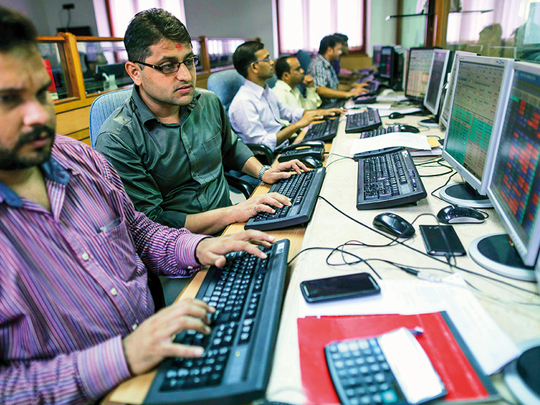
Equity investors in India should see the value of their holdings climb after the ruling party at the centre won a thumping victory in the country’s most populous state, a verdict that would embolden New Delhi to aggressively embrace market-friendly reforms. The rise, however, would be tempered by an expected quarter-point increase in US rates midweek.
Prime Minister Narendra Modi’s Bharatiya Janata Party (BJP) grabbed more than 300 seats in the 403-member assembly of Uttar Pradesh (UP) — a state with more people than Germany, France and the United Kingdom combined — in acrimonious provincial elections, unseating a powerful regional satrap that held power for the past five years and which fought the polls in alliance with Sonia Gandhi’s Congress party.
“The strong verdict in a heartland state, which is also the most impoverished, is a strident vote of confidence in Modi’s economic priorities,” said a senior money manager at one foreign fund who did not want to be named.
“The sheer sweep unequivocally shows that all strata of society — religious and caste divide, rich and poor — shunned political rhetoric and backed the prime minister’s aspirational and development agenda.”
The overwhelming victory reinforced that popular support remained undiminished for Modi despite hardships faced by people across the land as a result of his abrupt decision last November to scrap high-value bank notes, a move aimed at belling tax dodgers and counterfeiters.
The demonetisation of Rs1,000 and Rs500 notes that comprised 86 per cent of the currency in circulation, however, caused a severe cash crunch, hurt consumer spending, triggered inventory pile-ups and shutdowns of shifts at factories. Although the cash situation has eased considerably by now, economists say it would take a few months more to shake off the full impact.
The BJP also won the elections in Uttarakhand, but its alliance with a regional incumbent in Punjab lost to the Congress. The BJP and the Congress were in a tough fight in Goa and Manipur. All these states are minor in comparison to UP.
Optimism rules
“We are going to see a good rally in markets in the mid-term if BJP comes to power in UP and other states,” Motilal Oswal, chairman of Motilal Oswal Financial Services, told the Economic Times before the election results were released. “Modi could go for major reforms if he wins the UP elections.”
In the short-term, however, the market has already discounted for a BJP victory, he added. The top-30 Sensex and 50-share Nifty rose about 0.4 per cent each over the week to 28,946.23 and 8,934.55 respectively. The election results were announced on Saturday, and trading will resume on Tuesday after a three-day weekend, including a festival holiday on Monday.
All 12 equity analysts polled before the elections results by BloombergQuint said a win for the BJP in UP would provide the trigger for the Nifty index to breach its all-time high of 9,119.20 reached more than two years ago.
The landslide win in UP will enable the BJP to increase its strength in the central upper house of Rajya Sabha, where its lack of numbers has stalled many legislations. For markets, this would boost expectations for reforms such as labour and further opening up the economy.
While the markets are expected to open bullishly when trading resumes on Tuesday, caution is likely to take over with the US Federal Reserve’s rate-setting meeting to announce its decision on Wednesday. Economists expect the Fed to raise US rates on the back of robust jobs report and lingering concerns about inflation.
Higher US rates usually trigger an outflow of funds from emerging markets, affecting near-term price trends in stocks.
Robust appetite
Investors are pouring cash into domestic funds and crowding initial public offers, suggesting strong preference for risk securities amid falling interest rates and diminishing lure of bank deposits.
Citigroup said the demonetisation has triggered a flood of domestic savings into equity markets, adding that domestic cash flows into stocks may double to $55 billion (Dh202 billion) by the 2018-19 financial year from $28 billion in 2016-17.
“The cumulative mutual fund buying has been increasing steadily and demonetisation has added to that momentum,” Citi analysts Samiran Chakraborty and Anurag Jha said in a note to the investment bank’s clients.
Net flows into domestic mutual funds reached Rs1 trillion (Dh55.06 billion) in the three months post demonetisation, with more than a fifth of that going into equity funds. If the rising level of comfort among investors for financial securities is maintained, it could insulate the markets from volatile foreign fund flows, Citigroup said.
An IPO by Avenue Supermarts Ltd, which runs the popular D’Mart retail chain, to raise up to Rs18.7 billion received bids for 106 times the shares on offer, the company said in a statement.
Founded by Radhakishan Damani, a stockbroker, who owns more than 90 per cent of the company, Avenue Supermarts runs 117 D’Mart retail outlets. The offering at Rs295-299 per share was the biggest since PNB Housing Finance Ltd raised Rs30 billion last October.
The company aims to use Rs10 billion to retire debt and Rs3.67 billion to open new stores in central and south India.
Aurobindo, IndusInd
Goldman Sachs is upbeat on Aurobindo Pharma and has set a price target of Rs934 for the stock, saying that new product launches in the US are gaining momentum. This would boost earnings before interest, tax, depreciation and amortisation to 19 per cent over the next two years, well ahead of 12 per cent growth for its peers, the brokerage said.
Based on Friday’s closing price of Rs654.95, the target price represents a more than 40 per cent upside. The share has jumped about 11 times over the past five years.
“Aurobindo Pharma is transforming from simple generics player into one with a complex generics portfolio,” Goldman said.
Mid-sized lender IndusInd Bank confirmed in a filing that it was in talks with Bharat Financial, formerly known SKS Microfinance, as part of “exploring strategic alternatives”, responding to media reports a deal was in the offing to acquire the finance firm.
IndusInd, controlled by billionaire Hinduja brothers, said talk of merger or acquisition was “speculative” and no agreement has been reached. Media reports have said negotiations were underway for an all stock deal in the proportion of seven IndusInd shares for every 10 Bharat Financial.
The writer is a journalist based in India












